|
|
|
Sort Order |
|
|
|
Items / Page
|
|
|
|
|
|
|
| Srl | Item |
| 1 |
ID:
114382
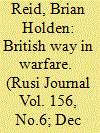

|
|
|
| 2 |
ID:
131437
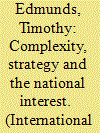

|
|
|
|
|
| Publication |
2014.
|
| Summary/Abstract |
British strategy-making has been subject to a sustained critique in recent years, from parliamentarians, retired members of the armed forces and scholars of strategic studies. This article examines the nature of this critique and the evolving character of strategic practice in Britain. It argues that the criticisms of British strategymaking are often misplaced, for two main reasons. First, many base their critique on a reductionist notion of unitary 'national interest' that fails to capture systemic patterns of complexity and contestation in the wider security environment and in Britain. Second, they underestimate or ignore the extent to which the UK strategic community is itself innovating in response to these themes, particularly since the 2010 Strategic Defence and Security Review. This is not to argue that considerable challenges do not remain for strategy-making in Britain. Most notably, these include: how to translate strategic innovation in departments and elsewhere into a coherent national strategic agenda; how to do this while maintaining institutional coordination and a shared sense of strategic purpose across government (and beyond); how to sustain and consolidate institutional expertise and experience in a rapidly changing civil service and at a time of continuing public austerity; and how to articulate and legitimate security policy decisions among a general public that is both disengaged from elite strategic discourse and sceptical of the efficacy of military force. Even so, the article concludes by arguing that it is possible to see the outline of an emergent and distinctive theory of action in contemporary British strategic practice, characterized by principles of adaptivity, anticipation, self-organisation and nascent cross-governmentalism.
|
|
|
|
|
|
|
|
|
|
|
|
|
|
|
|
| 3 |
ID:
132235
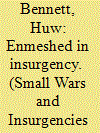

|
|
|
|
|
| Publication |
2014.
|
| Summary/Abstract |
Ten years of counterinsurgency in Iraq and Afghanistan have produced little in Britain's national interest. This article examines the political objectives set in these wars and the reasons why they have proved elusive. The core foreign policy aim was to sustain Britain's position as a great power by assuming responsibility for global order. Alliances with the United States and NATO would be the diplomatic tool for pursuing this aim. These alliances brought obligations, in the shape of agreed common threats. Rogue regimes with weapons of mass destruction and international terrorists harboured in failed states were deemed the primary threats to British security. Military means were therefore used in Iraq and Afghanistan to attack them. Whether Tony Blair's vision of global order ever made sense is debatable, and it attracted scepticism from the outset. The article argues experience in Iraq and Afghanistan showed that a strategy to eliminate terrorism (the WMD threat turned out never to have existed) by expeditionary counterinsurgency could only fail. Therefore the attention lavished on operational-level performance by most studies is misplaced, because no amount of warfighting excellence could make up for strategic incoherence. Finally, the article proposes the more important question arising from the last ten years is why the UK pursued a futile strategy for so long. The difficulties associated with interpreting events, a malfunctioning strategic apparatus, weak political oversight, and bureaucratic self-interest are posited as the most significant explanations.
|
|
|
|
|
|
|
|
|
|
|
|
|
|
|
|
| 4 |
ID:
114426
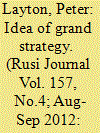

|
|
|
|
|
| Publication |
2012.
|
| Summary/Abstract |
The debate on British strategy-making continues with Peter Layton's reflections on the meaning and usefulness of the concept of 'grand strategy' in today's world. Grand strategy, he argues, is very distinct from 'strategy' and frequent tendencies to conflate the two overlook the former's wider scope and integrative, forward-looking nature: grand strategy aims to shape the world of the future.
|
|
|
|
|
|
|
|
|
|
|
|
|
|
|
|
| 5 |
ID:
132225


|
|
|
|
|
| Publication |
2014.
|
| Summary/Abstract |
British attitudes towards military intervention following the campaigns in Iraq and Afghanistan have undergone what appears to be considerable change. Parliament has voted against the use of Britain's armed forces in Syria and the public are unenthused by overseas engagement. Conscious of the costs and the challenges posed by the use of British military power the government has been busy revamping the way it approaches crises overseas. The result is a set of policies that apparently heralds a new direction in foreign policy. This new direction is encapsulated in the Building Stability Overseas Strategy (BSOS) and the more recent International Defence Engagement Strategy (IDES). Both BSOS and IDES set out the basis for avoiding major deployments to overseas conflict and instead refocuses effort on defence diplomacy, working with and through overseas governments and partners, early warning, pre-conflict prevention and post-conflict reconstruction. Developing a number of themes that reach from across the Cold War to more contemporary discussions of British strategy, the goal of this special edition is to take into account a number of perspectives that place BSOS and IDES in their historical and strategic context. These papers suggest that using defence diplomacy is and will remain an extremely imprecise lever that needs to be carefully managed if it is to remain a democratically accountable tool of foreign policy.
|
|
|
|
|
|
|
|
|
|
|
|
|
|
|
|
| 6 |
ID:
114370
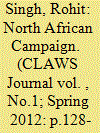

|
|
|
| 7 |
ID:
138349
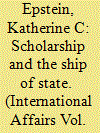

|
|
|
|
|
| Summary/Abstract |
This article uses the centenary of the First World War as an opportunity to re-examine a major element of the existing literature on the war—the strategic implications of supposed British decline—as well as analogies to the contemporary United States based upon that interpretation of history. It argues that the standard declinist interpretation of British strategy rests to a surprising degree upon the work of the naval historian Arthur Marder, and that Marder's archival research and conceptual framework were weaker than is generally realized. It suggests that more recent work appearing since Marder is stronger and renders the declinist strategic interpretation difficult to maintain. It concludes by considering the implications of this new work for analogies between the United States today and First World War-era Britain, and for the use of history in contemporary policy debates.
|
|
|
|
|
|
|
|
|
|
|
|
|
|
|
|
| 8 |
ID:
131439
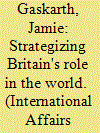

|
|
|
|
|
| Publication |
2014.
|
| Summary/Abstract |
In recent commentaries on British foreign policy, the New Labour and coalition governments have been criticized for lacking strategic thinking. Academics describe a 'strategy gap' and note that old ideas about Britain's role in the world, such as Churchill's 1948 reference to 'three circles', continue to be recycled. Parliamentarians bemoan the 'uncritical acceptance of these assumptions' that has led to 'a waning of our interests in, and ability to make, National Strategy'. This article argues that a primary problem has been the lack of consideration of how identity, strategy and action interrelate in foreign policy. Using the insights of role theory, the article seeks to address this by outlining six ideal-type role orientations that the UK might fulfil in world politics, namely: isolate, influential (rule of law state), regional partner, thought leader, opportunist-interventionist power and Great Power. By considering how variations in a state's disposition towards the external environment translate into different policy directions, the article aims both to highlight the range of roles available to policy-makers and to emphasize that policy often involves making a choice between them. Failure to recognize this has resulted in role conflicts and policy confusion. In setting out a variety of different role orientations, the author offers a route to introducing a genuine strategic sensibility to policy-making, one that links identity with policy goals and outcomes.
|
|
|
|
|
|
|
|
|
|
|
|
|
|
|
|
| 9 |
ID:
131438
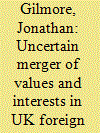

|
|
|
|
|
| Publication |
2014.
|
| Summary/Abstract |
How should ethics and values relate to the British national interest? The idea that ethical commitments to distant non-citizens should occupy a position within British foreign policy was a controversial element of Labour's foreign policy during the early part of their 1997-2010 tenure. Rather than undermining traditional national interest concerns, one of the defining themes within Labour's foreign policy was that values and national interests were becoming increasingly merged in a globalized world. The post-2010 coalition government has made distinct efforts to differentiate themselves from their predecessors, crafting a more pragmatic and national interest-based foreign policy approach. Despite this, significant continuities with Labour's 'ethical dimension' are evident and many associated policies and practices have survived the transition. Moreover, the suggestion that British values and interests are interrelated and mutually reinforcing has been re-asserted, with renewed vigour, by coalition policy-makers. The article traces the ways in which values and interests have become increasingly merged in the language of recent British foreign policy and examines the implications for our understanding of the UK's national interest. It argues that the idea of an almost symbiotic relationship between values and interests is fundamentally unhelpful and makes the case for greater disaggregation of the two. Although a zero-sum game need not exist between core national interests and ethical obligations abroad, the suggestion that they are mutually reinforcing obscures the tensions that frequently arise between these different realms of obligation. Using the examples of failed state stabilization and UK arms trade regulation, the article demonstrates how uncritical acceptance of the values-interests merger risks producing unstable policy formulations.
|
|
|
|
|
|
|
|
|
|
|
|
|
|
|
|
|
|
|
|
|